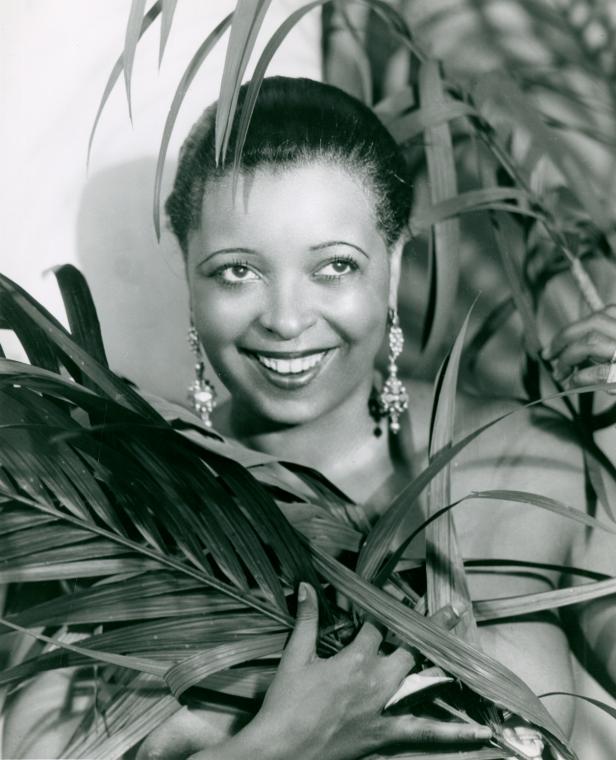Joy Out of Fire: Ethel Waters
Written By: Jillian Peprah-Frimpong
Pre-Professional, Schomburg Center for Research in Black Culture
Student, New York City Museum School
This post is the second in the "Joy Out of Fire" series on expressions of femininity reclaimed by 20th century Black women entertainers and inspired by Firelei Baez: Joy Out of Fire currently on display in the Latimer/Edison Gallery at the Schomburg Center.

Born to 12-year-old Louise Anderson, who was raped by a much older John Waters, Ethel Waters spent her childhood malnourished - both physically and mentally - in the racially mixed town of Chester, Pennsylvania. Neglected by her parents, Waters had to fend for herself. She spent her days plotting with thieves and running errands for drug lords in neighboring cities in exchange food and shelter. Waters was often torn between living with her beloved grandmother “Sally”, her aunts Vi and Ching, and her estranged mother. Ultimately, Waters found her route of escape through music.
At 13-years-old, Waters had divorced her first husband, Merritt Purnsley, and began a short-lived career as a maid to support herself while staying in Philadelphia. While singing for a talent show, she was discovered by producers and managers but never signed to a label. She continued to display her talent at church functions and gatherings, going under the moniker “Sweet Mama Stringbean” before solidifying her musical identity as Ethel Waters. On her 17th birthday, while at a costume party in Philadelphia, Waters was persuaded to perform two songs and ultimately impressed her guests. This performance landed her a professional gig at Lincoln Theater in Baltimore. Following the end of her tour in Baltimore, Waters began to travel the rest of the country with a vaudeville group including Bessie Smith, performing ballads and starring in blackface skits for predominantly white audiences.
Directly after her vaudeville career, Waters moved to New York in 1919 and performed in nightclubs and speakeasies across Harlem, most notably Edmond’s Cellar. She later signed to jazz/blues Black-owned record label Black Swan for two years before signing to Columbia Records, where she achieved her greatest hit and received a Grammy Hall of Fame award for the record “Dinah.” Waters quickly earned fame in NYC for her ability to fuse the jazz and blues sound and struck audiences with her performance of “Stormy Weather” in 1933 at the Cotton Club in Harlem. Waters’ singing style was distinct compared to the styles of her jazz contemporaries. She prioritized clear enunciation and used her soft, yet full-bodied voice to change the presentation of jazz music in the 1920s and 30s. Her appearance in the 1927 Broadway musical “Africana” caused her to be scouted by composer and songwriter Irving Berlin. Although the white entertainment industry expressed difficulties in casting a Black actress and singer for fear of offending their white audience, Berlin emphasized that Waters’ success was solely based upon her talent and will.
In 1943, Waters made her acclaimed acting debut as Petunia Jackson, the loving wife in the motion picture “Cabin in the Sky.” Waters often played the motherly figure or nurturing spouse, mammy stereotype often reserved for Black women in film. In “Pinky,” released in 1949, Waters takes on the role as old laundress, Granny Dicey, grandmother of Pinky Johnson, a woman who had spent her life passing for white. In the film, often recognized as a groundbreaking classic examining race, Waters transformed what could have been a well-known caricature of Black women into a bold, fearless enigma, and was the second Black woman nominated for an Academy Award (Hattie McDaniel was the first). In 1939 Waters became the first Black person to star in his or her own television show and in 1962, she became the first Black woman nominated for an Emmy.
Though born into poverty and adverse circumstances, Waters worked her way to the top of the entertainment industry and used her public image to reclaim, redefine and add complexity to Hollywood stereotypes reserved for Black women.
Learn more about Ethel Waters in the Schomburg/NYPL Collections:
- The Ethel Waters Portrait Collection, SchomburgPhotographs and Prints Division
- Ethel Waters Sound Recording, Moving Images and Recorded Sound Division
- Ethel Waters: Stormy Weather Research and Reference Division
- Ethel Waters, NYPL Digital Collections
Read E-Books with SimplyE
 With your library card, it's easier than ever to choose from more than 300,000 e-books on SimplyE, The New York Public Library's free e-reader app. Gain access to digital resources for all ages, including e-books, audiobooks, databases, and more.
With your library card, it's easier than ever to choose from more than 300,000 e-books on SimplyE, The New York Public Library's free e-reader app. Gain access to digital resources for all ages, including e-books, audiobooks, databases, and more.
If you don’t have an NYPL library card, New York State residents can apply for a digital card online or through SimplyE (available on the App Store or Google Play).
Need more help? Read our guide to using SimplyE.
Comments
Ethel Waters write up
Submitted by Frances Garcia-... (not verified) on January 8, 2019 - 9:22am